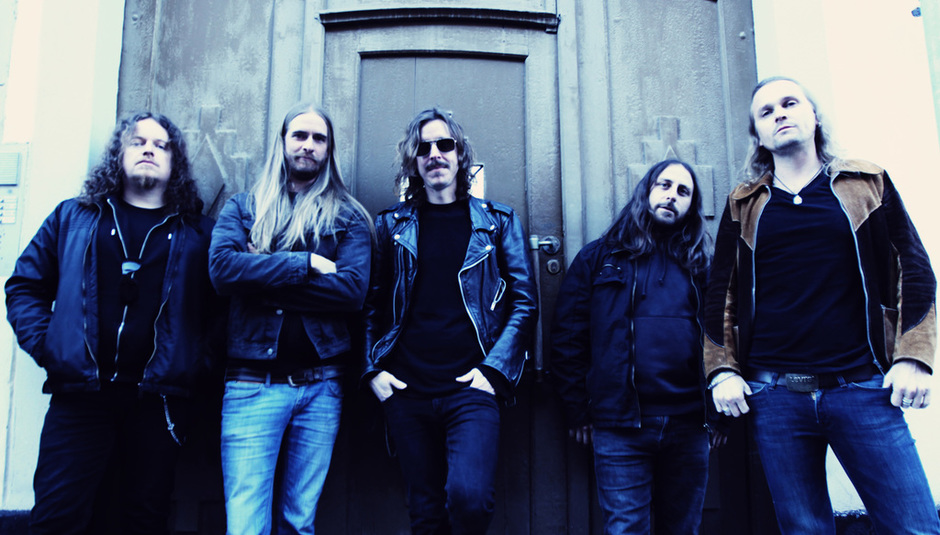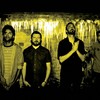Opeth have become an institution. Formed in Stockholm in 1990 as a death metal group, they have become one of the most influential and distinctive groups of the last twenty-five years. With frontman Mikael Åkerfeldt at the helm, they sought to combine progressive rock, folk and extreme metal in a manner that no other group had previously attempted. Albums such as 1999’s Still Life and 2001’s Blackwater Park are essential additions to the record collection of anyone with a passing interest in progressive music of any stripe.
To celebrate the group’s twenty-fifth anniversary the band undertook a brief tour playing 2005’s Ghost Reveries record (a fan favourite) in full, whilst also looking at their catalogue as a whole, which recently has left behind extreme metal in favour of a sound more influenced by classic progressive rock on albums Heritage and Pale Communion. They have also re-released the albums Deliverance and Damnation in one package, reflecting the fact that they both originated during the same period in 2002-2003. If anything the band are as successful as ever. DiS caught up with Åkerfeldt to discuss the band’s rich history.
DiS: So, twenty-five years of Opeth. If someone had told you back in 1990 that the band would last this long how would you have responded? I’d have said ”Of course!” When I was 16 of course life was different. Easy. I was convinced I’d make it in the music business, mainly because I knew I’d be good at it. With this I mean that I loved it so much, and once I love something I will excel at it. Simple as that. Had I set my sights on tennis, I’d become good at that too I believe. I just need to have a pure love for things and I’d do fairly well within that field. If I didn’t have the interest I’d not be able to blow my nose properly.
DiS: How have the shows to celebrate the anniversary been? In particular, how has it been to revisit the ‘Ghost Reveries’ records, which you have been playing in full on its tenth anniversary?
It was one of my favorite tours ever to be honest. I liked it. It was business as usual in many ways, but I felt that we have made an impact. I felt that we’re a different band to all other bands out there. There’s only one Opeth. We have a unique sound, regardless of what we do, it will sound like us. So playing those old songs was quite interesting. It made me see Ghost Reveries in a new light. Also, performing songs that are both older and more recent made me feel quite proud of the musical aspect of this band. On top of that we played packed theaters everywhere, so all in all, it was a great success.
DiS: These shows were announced a long time in advance and were highly anticipated by the fans. Did you feel under extra pressure to perform?
There’s always pressure. We always do the best we can. I get very irritated if something is in the way of us doing our best. It’s happened that we’ve been working with the wrong people that’s made it more difficult for us, and of course every night is different… but we always ”try” our best at least.
DiS: How did you go about preparing a show that matched the expectations?
Rehearsing. Breaking down the songs so we’d get the best out of them. We usually want to play versions that are as close to the original the best we can, but sometimes we rearrange things to make it more interesting. Like with the song ‘Atonement’ for instance on this tour. Some of the material has over 100 recorded tracks from the studio versions and we only have ten arms collectively. But I think we did fairly well reproducing new versions of these songs.
DiS: The Theatre Royal in Drury Lane is the latest great London venue you have taken Opeth to, and previously you’ve obviously been at the likes of the Union Chapel and the Royal Albert Hall. Have you deliberately looked for opportunities to play heavy music in more traditional venues like these?
We’ve done our share of touring. We’ve been almost everywhere. We play regular clubs, pubs, arenas. You name it. For this tour we deliberately wanted theaters. Something that added to the whole experience. There’s a different reverence that comes automatically when you play inside theaters like the Albert Hall or Theatre Royal. I got a taste for it now. I want to make that the norm for Opeth, even if I’m sure we’ll do many sweaty clubs in the years to come.
DiS: The ‘Deliverance’ and ‘Damnation’ records are being reissued now as they were originally intended. Is this something you have always hoped to be able to do? How frustrating was it at the time when the record label decided to release the two albums separately?
On the contrary, it was my decision to separate the two as far as I remember. We wanted to have a longer time to promote the records which is why they were put out separately. The reissue makes sense as they’re recorded at the same time. They’ve been remastered and remixed and sound amazing. But they’re also old records now. I have a different feeling about them and don’t necessary feel the need to promote them separately, or at all to be honest. It’s just a good package of two of our hopefully-soon-to-become-classic-records. They sound much better now than they did back in the day if you ask me. We haven’t added anything or re-recorded anything. They’re the originals sounds but tweaked so it sounds better and closer to how I wish they had sounded in the first place. Steven Wilson did the Damnation mix a while back out of his own initiative. Bruce Soord (The Pineapple Thief) did Deliverance and made it sound more “real” than the original mix. It was a disastrous recording and it didn’t have a place in my heart until now. I was indifferent to that record, but now I think I love it. Only took twelve or thirteen years!
DiS: Obviously this pair really showcases the two different sides of Opeth. I’ve always wondered how you see this contrast? Have you always been trying to balance the two?
Damnation was an experiment that ended up changing the band drastically in every way. We’ve always had the soft side, we’ve had the ballads and the acoustic interludes always, but never had we done anything like that. It was met with a shrug at the time, but now it’s highly regarded by our fans. Deliverance is a really good record but marred by the difficult recording and there were severe strains within the band. It was a horrible time. At least now I can exhale and be a little bit proud of it. Wilson did a great job on that one and Andy Sneap really “saved” the recording back then, but it sounds better now I think.
DiS: The band’s music has changed a lot over the years – particularly on the most recent two albums, of course. Do you feel the band’s fanbase has now come to terms with the move away from metal on the last two releases?
Perhaps. But the so-called ”new” sound is not here to stay really. I don’t know. We might do something completely different. I’m happy if we end up having a diverse discography, and it doesn’t matter if we’re considered to be an inconsistent band. As long as we’re not considered samey, I’m fine… or as long as we don’t consider us samey at least. Fans have their favorite records or eras regardless of what I think.
DiS: What would you say to continued critics of the band’s new style? It always seems churlish to me to criticise bands for choosing to make the music they want to make…
It’s taste I guess. Some people don’t think ‘Taxi Driver’ is a good film and prefer Adam Sandler. We are more De Niro than Adam Sandler but public opinion is not how I think. And De Niro did both Travis Bickle and Rupert Pupkin, you know. Adam Sandler has become known for playing a slightly retarded character in virtually all his films. It’s what he does. He’s happy with it and his fans are happy with it too. So don’t fix it. Just that we’re not happy with being that, or ‘Taxi Driver’ all the time either for that matter.
DiS: Does the change reflect a decline in your own interest in extreme metal music at all? I know you’ve stopped doing Bloodbath as well now…
I don’t consume that music anymore unless I’m in a party vibe. I love some of the older bands like Celtic Frost, Morbid Angel, Bathory and Autopsy, but new metal is too polished for me. It’s a paradox since we’re so polished in comparison but “my” death metal has to be gritty and dirty. Not polished, quantized and “perfect”. And I never considered Opeth to be a pure death metal band anyways. It’s in our DNA but there’s a lot more to Opeth than death metal. It’s virtually only been the vocals, the screams, that had us rubbing shoulders with our extreme metal peers. You take the screams out and we’re some type of metal, but not very extreme like that.
DiS: Watershed is probably one of my favourite Opeth records, but looking back now I feel like it marks an appropriate end point for the “traditional” Opeth sound in a sense. It really felt like it pushed the boat out in terms of some of the arrangements and influences it threw in…
It was the best and the last album I could make in that style at that point. I love it. It’s a great record. ‘Heir Apparent’ is the heaviest song we have I think. ‘Lotus Eater’ is the weirdest. ‘Hex Omega’ is one of our best” ‘Hessian Peel’ is a corker! ‘Coil’ is beautiful and ‘Porcelain Heart’ is marvelous too. Boasting? Forgive me. But of course I dig our stuff or it wouldn’t have been made available.
DiS: Has the way you write songs changed over the last twenty-five years?
Yes. I write more complete songs now than I did. I love to experiment and I love when I like something without knowing why. It pushes me forward and makes my mind expand a little. I just keep looking for a ”feel” now while before I didn’t know what the hell I was doing. Feels like I was lucky in retrospect, but some songs really has a unique feel. I feel detached from past works, as in it feels like I didn’t write them, but I did. And I’m extremely happy about them all. Even the bad songs.
DiS: Has leaving behind the death metal elements made songwriting an easier, or more natural, process for you at all? Whilst I love Watershed, listening back to it recently I felt that it sounded like a hard record to write, largely because the contrast between the extreme metal moments and other moments felt more severe than normal. Pale Communion, in contrast, has a real natural flow to it…
I think I’ve focused a bit more on the vocals. Death metal vocals only needed rhythm and feel, but writing vocal lines you need melody too. So it’s harder because of that. If I write a death metal song I know it’s good enough even before the screams are added: if the riffing and arrangement is good, the song is good. Now I have the vocals carrying the song a lot more which makes it harder, but once you hit the spot it’s a more fulfilling feeling to me. Watershed is an apt title as the album was a watershed moment. Can’t remember if I chose that title because of it, but it couldn’t have been better really.
DiS: The amazing thing, for me, is just how big a band Opeth have become. I appreciate you aren’t chart-toppers but for a band with roots in progressive rock and death metal, you are massively successful. Do you feel the band has benefited from a renewal of interest in progressive music in particular?
Yes we have. Once we became “softer” we got more interest from the progressive rock audience. We’re voted best band and best album with Pale Communion in Prog magazine but at shows there’s all sorts of people. It’s just music, you know. To the general person I think after a specific age you listen to music that you like. Once your personality has settled you become less interested in fitting in or making a statement. Luckily we have interest from both sexes and all ages, and all styles. And I don’t discriminate. If you like us, it doesn’t matter who you are, you’re highly valued. Until you start pointing fingers and telling us what we should do, that is.























